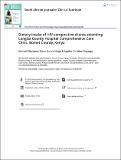Dietary intake of HIV-seropositive clients attending Longisa County Hospital Comprehensive Care Clinic, Bomet County, Kenya
Publication Date
2020Author
Kenneth Kipngeno Tonui, Eunice Njogu, Agatha Christine Onyango
Metadata
Show full item recordAbstract/
Inadequate dietary intake, infections and stage of disease progression elicit malnutrition among HIV-seropositive individuals,
which hastens progression of HIV to full-blown AIDS.
Aim: The study sought to determine the dietary intake of HIV-seropositive clients attending Longisa County Hospital
Comprehensive Care Clinic, Bomet County, Kenya.
Methods: A cross-sectional analytical study design was administered on a comprehensive sample of 210 patients. A 24-hour
dietary recall questionnaire and Food Frequency Questionnaire (FFQ) were used by the researcher to collect data on the
dietary intake of the respondents. The 24-hour dietary recall data were analysed using NutriSurvey whereas data obtained
from the FFQ were analysed manually.
Results: Study respondents comprised more females (61.6%) than males (38.6%). Adequacy in energy intake amongst the
respondents was average as males attained 47.4% of recommended energy intake, whereas females attained 50.0%. Intakes
for selected nutrients, vitamin A, B1, B2, C, were adequate for males and females. Iron intake was significantly low among
female respondents as 89.3% did not meet the RDA. Similarly, zinc intake among male respondents was low as only 28.9%
met the RDA. The mean number of meals consumed by the respondents was 3.8 ± 0.1. Consumption frequency of legumes,
fruits, other vegetables, meats, eggs and fish was irregular.
Conclusion: The dietary intake of the respondents was not satisfactory as evidenced by inadequacies in intake of certain
nutrients and low number of meals consumed on a daily basis. Inadequate dietary intake is detrimental to HIV and AIDS
management and treatment modalities, hence resulting in poor treatment outcomes. Care and treatment modalities at HIV
and AIDS clinics should encompass provision of clear and concise information on the importance of adequate dietary intake
as a means of optimising positive treatment outcome

